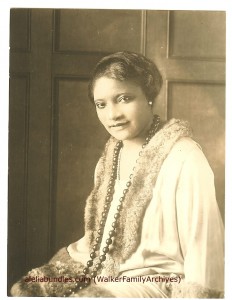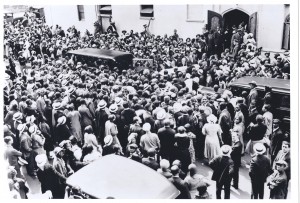Eighty years ago this month on August 17, 1931–after a lovely day at the beach celebrating a friend’s birthday– A’Lelia Walker, my great-grandmother and namesake, died in Long Branch, New Jersey.
Related: Listen to A’Leila Bundles and Danny Tisdale discuss Harlem History on The Danny Tisdale Show >>>
She and six pals from Harlem had enjoyed the sea breezes and dined on lobster and chocolate cake earlier that day. Prohibition notwithstanding, they’d toasted each other with champagne. And, there had been lots and lots of laughter.
Just as the parties she hosted at her salon, The Dark Tower, and in her mansion, Villa Lewaro, had been grand, so was her funeral. Here’s my description from On Her Own Ground: The Life and Times of Madam C. J. Walker, my biography of A’Lelia Walker’s mother, entreprenuer Madam C. J. Walker.
“More than 11,000 people filed through Howell’s Funeral Home [on Seventh Avenue in Harlem] the night before the services…In the open casket, A’Lelia wore a gown of gold lace and tulle over lavendar satin with a pale green velvet sash draped around her body. Her feet were covered in apple-green satin slippers. Around her neck were her cherished Chinese amber prayer beads…Three orchids, a gift from Bessye Bearden [mother of artist Romare Bearden], had been placed in her hands.”
“By early Saturday morning nearly 1,000 people had gathered outside the mortuary for the invitation-only funeral. ‘But just as for her parties, a great many more invitations had been issued than the small but exclusive Seventh Avenue funeral parlor could provide for,’Langston Hughes remembered [in his autobiography, The Big Sea].”
“Appropriately the service was filled with music performed by A’Lelia’s friends. The Bon Bons, a female quartet, opened with “Steal Away to Jesus.” Paul Bass, who often had entertained at 80 Edgecombe [her pied-a-terre], offered ‘I’ll See You Again,‘ A’Lelia’s favorite melody from Noel Coward’s 1929 play, Bitter Sweet…Mary McLeod Bethune, speaking ‘in that great deep voice of hers,’ delivered the eulogy…As friends and family sifted through the meaning of Mrs. Bethune’s words, Inter-State Tattler columnist and music critic Edward Perry read ‘To A’Lelia,’ a poem that Langston Hughes had written two days after A’Lelia’s death.
So all who love laughter/And joy and light,/Let your prayers be as roses/For this queeen of the night.
Later, at Woodlawn Cemetery, Mae [Walker Perry, her daughter], Marion [Perry], Mayme [White], Mrs. Bethune and a small group gathered around the flower-filled space that had been dug beside her mother’s grave. From above,Colonel Hubert Fauntleroy Julian, the world’s first black licensed pilot, dropped two bouquets of gladiolas and dahlias from a small plane. ‘That really was the end of the gay times of the New Negro era in Harlem,’ Hughes later wrote. ‘The Depression brought everybody down a peg or two. And the Negroes had but few pegs to fall.’”
Years later her friend Carl Van Vechten, the novelist and photographer, described A’Lelia Walker to Chester Himes, author of If He Hollers, Let Him Go: “You should have known A’Lelia Walker. Nothing in this age is quite as good as THAT…I miss her…What a woman!”
Hughes described her as “a gorgeous dark Amazon in a silver turban…A’Lelia Walker was the joy goddess of Harlem’s 1920s.” (via A’Lelia Bundles).
Become a Harlem Insider!
By submitting this form, you are consenting to receive marketing emails from: Harlem World Magazine, 2521 1/2 west 42nd street, Los Angeles, CA, 90008, https://www.harlemworldmagazine.com. You can revoke your consent to receive emails at any time by using the SafeUnsubscribe® link, found at the bottom of every email. Emails are serviced by Constant Contact










